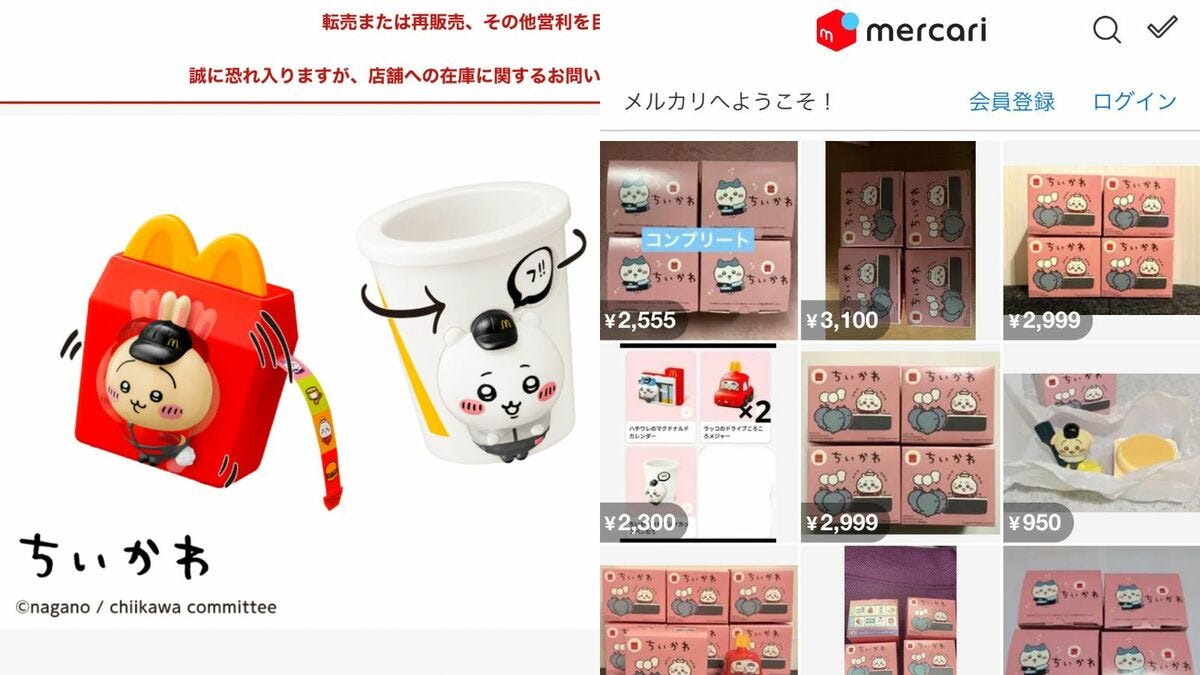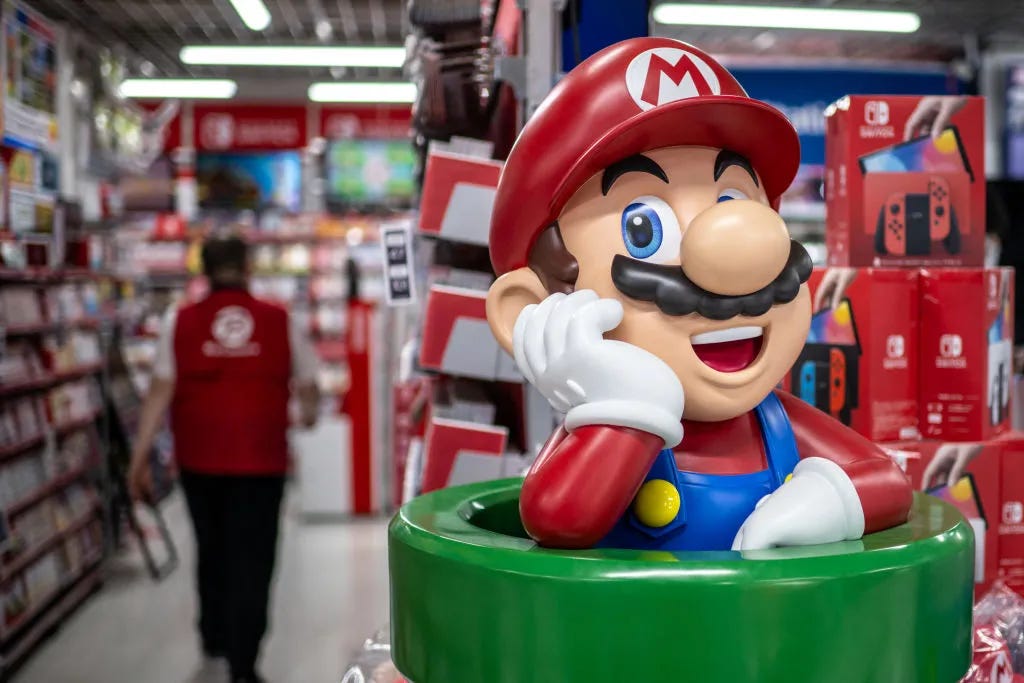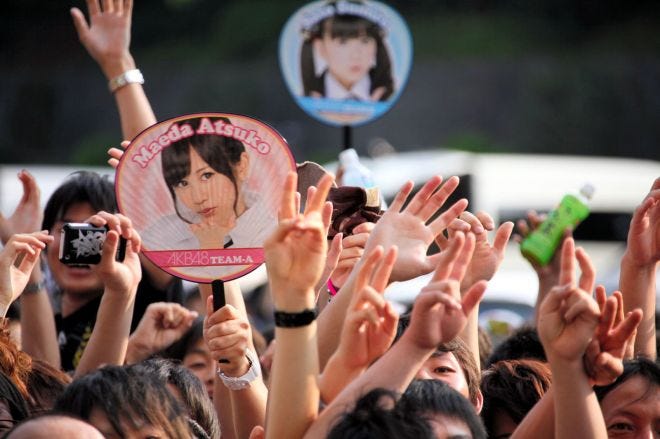Why Japan's Scalper Crackdown Is Getting Serious: From McDonald’s Toys to Nintendo Consoles, Resellers Are Feeling the Heat
Japanese pop culture news edited by Patrick Macias
“Here come the scalpers again.” “Why aren’t companies doing more?” Frustration over product resellers, known in Japan as tenbai-yaa, a slang blend of "resell" and "buyer," is mounting by the day. News reports targeting them are now practically daily fare.
Recent headlines have centered on the resale of reservations and limited merchandise for the upcoming 2025 Osaka-Kansai Expo, including premium pavilion slots and exclusive souvenirs. Just behind that in visibility: McDonald’s Japan. When the first wave of toys for their Happy Meal promotion featuring Chiikawa and Minecraft: The Movie launched on May 16, resellers flooded online marketplaces. Photos of untouched burgers and drinks discarded after only the toys were taken went viral, drawing fierce criticism. The promotion ended early on May 18, triggering even more backlash.
Some Companies Are Fighting Back
Just days later, on May 20, Nintendo revealed the lottery results for the second round of Nintendo Switch 2 preorders. Praise poured in, not just for the product, but for Nintendo’s proactive anti-scalping strategy. On May 21, marketplace giant Mercari followed suit with a statement promising better protection for users, including stricter action against fraudulent accounts. Still, some critics argue that these steps don’t go far enough, especially when viewed alongside McDonald’s more passive approach.
Elsewhere, entertainment agency STARTO ENTERTAINMENT publicly announced legal action against over 200 individuals caught reselling concert tickets. Their lawyers are contacting the offenders directly and threatening further measures, especially if personal information is withheld.
All of this renewed attention on scalping begs the question: why is scalping such a big problem in Japan? And why do so many people continue to buy from resellers, despite the outrage?
Why People Become Scalpers
While profit is the obvious motive, interviews with scalpers reveal two primary mindsets. The first type gets hooked after a single small win, perhaps selling secondhand goods online, then continues for the thrill. For scalpers, it’s like a game: choosing the right product, setting the right price, writing the perfect listing.
This "casual" group tends to focus on popular, low-margin items with guaranteed appeal, like the McDonald’s Happy Meal toys. Their moves are often influenced by social media chatter and trend pieces. In this case, both Chiikawa and Minecraft have large international fanbases, and online buzz created a “first-day rush” mentality. Because the toys are distributed at random, duplicates are common, which also fuels the resale cycle.
The second type is more calculated. They treat reselling as an alternative job, sometimes even hiring part-timers to help buy out items in bulk. Some hoard collectible toys for years before reselling. Others coordinate to snag concert tickets. Many cite reasons like “I don’t want a regular job,” or “I’m not good with people,” framing it as the only way to make money with limited options. Most describe themselves as students, part-timers, stay-at-home parents, or salaried workers looking for side income.
Interestingly, few show guilt. Many rationalize it: “I’m not making a huge profit,” “I’m offering something people want,” “I’m not the only one doing it.” This moral flexibility extends even to reselling items to people in similar circumstances, like other parents or fans of the same artists. That sense of disconnection is part of why public anger toward scalpers runs so deep.
Why People Keep Buying From Them
So why do buyers play along? In recent years, Japan has seen a rise in “oshi-katsu,” spending money to support a favorite artist, character, or fandom. Many are willing to cut back on everything else for their “oshi.” That has blurred the line on what counts as a “reasonable” price.
One reseller put it bluntly: “Buyers only care about whether they can win the auction, not the price. They’d rather pay extra than miss out.” A female fan supporting an idol group said, “Even if buying from scalpers doesn’t help the artist, at least it’s not someone I know profiting, so I don’t mind.” Some justify buying banned resale items by saying, “I already spend a lot on official merch, so it balances out.”
This self-focused attitude distorts the market and keeps scalping profitable. The only real deterrent would be a collective refusal to buy, but that’s far from reality.
What Companies Can and Should Do
Nintendo has been widely praised for its lottery system requiring applicants to have at least one year of paid Switch Online membership and 50+ hours of gameplay. That “fan-first” approach made scalping difficult and reduced backlash, even among those who didn’t win.
Meanwhile, on May 22, McDonald’s Japan tried damage control by limiting Happy Meal purchases to four sets per person when round two of the campaign launched. But it was the same cap used during round one, so public trust wasn’t restored. Critics are calling for stricter steps, limiting orders based on how many kids a customer has, daily app-only purchases, and other creative safeguards.
Other companies are also under pressure to do more. Suggestions include secure resale platforms, banning multiple accounts, using QR codes that can't be transferred, requiring buyers to answer questions about the item, and making products to order when demand spikes. The underlying message: if companies don’t act, their brands may suffer. Some scalpers even target businesses with weak defenses on purpose, which is why experts are now recommending internal anti-scalping teams.
What Scalpers Fear Most
When asked what they genuinely fear, scalpers gave surprisingly simple answers: limits on how many items you can buy, bans on multiple accounts, having to write your name on the packaging, or credit card-only sales.
But what really scares them is government regulation. Currently, only one law specifically targets ticket scalping. Many fear that if Japan enacts broader legislation or enforces stricter tax rules, the game might be over.
Some are already on shaky legal ground, reselling used goods without a license, failing to report income to tax authorities. On top of that, organized reselling rings, foreign scalpers, and criminal groups are entering the picture. It’s clear that Japan needs a long-term strategy to address the problem.
If there’s one thing regular people can do today, it’s to create failure points for resellers. When an item doesn’t sell and the scalper is forced to lower their price, even slightly, that’s a win. Refusing to take part in high-priced resale markets also helps protect access for everyday fans who just want to enjoy things fairly.
Original article by Takashi Kimura – Columnist, Human Relations Consultant, TV Commentator









